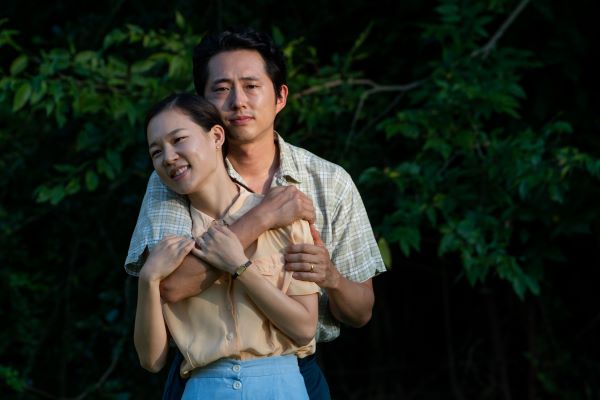

The Yi family, first-generation South Korean immigrants, have moved sometime in the 1980s from California to Arkansas, where Jacob (Steven Yeun), the father, has purchased land with the intention of growing Korean produce. This is not land that anyone wants—we learn later that an Arkansas farmer tried and failed to make use of it. Yet to Jacob this land is, in his words, the Garden of Eden with its wide-open fields, woods, and a stream. It is a patch of earth where, finally, he can have something that he owns.
His wife, Monica (Yeri Han), though, does not share his enthusiasm, and is deeply worried about this endeavor, the isolation they will experience, and mostly their children, Anne (Noel Kate Cho) and David (Alan Kim), who have no one to watch them while she’s at work. Much of the film is seen through David’s eyes as he and his sister explore this new place and watch or overhear their parents argue. He is an additional source of great anxiety for his parents, since the seven-year-old has a heart condition.
The rhythm is naturalistic, and the action is composed of the family’s everyday doings, though there is a poetic lift in the imagery and in the music, which lightly emphasizes the haze of memory. Their new home—a trailer that lacks front steps when they move in—is precisely realized as they gradually fill it with their belongings. Monica spends much of her time in a factory sexing chicks (separating the males from the females, that is) while Jacob devotes most of his energy to the farm.
He is soon joined in his work with Paul (Will Patton), a deeply religious but kindly eccentric, while Monica’s kind but foul-mouthed mother, Soon-ja (Yuh-Jung Youn), arrives from South Korea to keep an eye on the children. She shares a room with David, who struggles with her presence because she does not fit his image of what a grandmother is supposed to be. She does not, for instance, bake cookies or read to him. Instead, she is coarse, smells, sometimes makes crude comments, and loves to watch professional wrestling.
What is brought to light brilliantly is a sense of the precariousness of their lives. Questions linger over all the action. How long will the marriage last? How precarious is David’s health? Will this farm ever be realized? Will they ever be at home in the surrounding community? (Their existence is tenuous, and Jacob’s dreams are outsized.) Almost every scene serves to illuminate another aspect of the uncertainty that hovers over their lives and to enrich our understanding of this family.
So many scenes are so poignant that it feels pointless to try to list them. If the skeleton of the story sounds somewhat familiar, the refreshing specificity of character and situation makes it feel new and unexpected. Many of the most beautiful moments involve David and Soon-ja and their struggle to get to know each other.
It is also worth noting the extent to which many characters gently surprise preconceived notions, most evident in the portrayal of the white townsfolk. They approach the Yis with a curiosity, and some with casual racism that is not malicious but ignorant, and offer genuine, if first tentative, gestures of friendship.
If the film ends on a note of reconciliation, emphasizing the resilience of the minari plant, which Soon-ja has planted along the creek, the uncertainty is not dispelled. In other words, Lee Isaac Chung’s film does not talk down to us nor try to make his characters’ lives look easier than they are. It can be easy to overpraise films when awards season rolls by, yet Chung’s film is one I think will stand up to multiple viewings. With Sean Durkin’s The Nest, it is one of the best recent films of family life.
















Leave A Comment